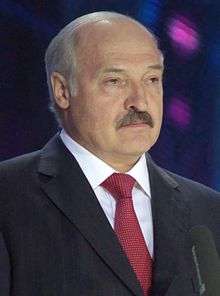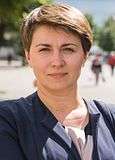Belarusian presidential election, 2015
| | |||||||||||||||||||||||||||||||||||||||||||
| |||||||||||||||||||||||||||||||||||||||||||
| |||||||||||||||||||||||||||||||||||||||||||
| |||||||||||||||||||||||||||||||||||||||||||
Presidential elections were held in Belarus on 11 October 2015.[1] Long-term president Alexander Lukashenko ran for his fifth term in office, having won every presidential election since independence in 1991. He was re-elected with 83.47% of the vote. The 'against all' option received more votes than any opposition candidate.
Background
Prior to the vote, six incarcerated opposition figures were pardoned by Lukashenko. The move was welcomed by the OSCE electoral observer mission with the head of the delegation, Kent Härstedt, saying: "The recent release of political prisoners and a welcoming approach to observers were positive developments. However, the hope that this gave us for broader electoral progress was largely unfulfilled."[2] The International Federation for Human Rights reported that it is likely that released political prisoners in Belarus still have many rights curtailed, such as inability to work for the government or run for public office, police visitations, and restriction of travel.[3] Fewer protests occurred during this presidential election than during others, mostly due to unease over the Maidan protests in Ukraine two years prior. The government of Belarus exploited this unease by advocating stability over change, and even opposition leaders opposed protests.[4]
Candidates
A total of eight candidates attempted to register to run in the elections by collecting the required 100,000 signatures; incumbent President Alexander Lukashenko running as an independent, Belarusian Left Party "A Just World" chairman Sergey Kalyakin, Liberal Democratic Party chairman Sergei Gaidukevich, People's referendum member Tatsiana Karatkevich, United Civic Party chairman Anatoly Lebedko, economist Viktor Tereshchenko (who ran in the 2010 elections), unemployed teacher Zhanna Romanovskaya and Belarusian Patriotic Party chairman Nikolai Ulakhovich.
Although five candidates (Lukashenko, Ulakhovich, Gaidukevich, Tereshchenko and Karatkevich) obtained over 100,000 signatures,[5] the vast majority of Tereshchenko's signatures were declared invalid,[6] resulting in only four candidates (marked in bold) being able to contest the elections.[7]
| Candidate | Political party | Initiative group | Submitted | Valid | |
|---|---|---|---|---|---|
| Members | Leader | ||||
| Alexander Lukashenko | Independent | 10,577 | Mikhail Orda | 1,761,145 | 1,753,380 |
| Nikolai Ulakhovich | Belarusian Patriotic Party | 1,426 | Mikhail Vobrazaw | 159,805 | 149,819 |
| Sergei Gaidukevich | Liberal Democratic Party | 2,481 | Anatoly Khishchanka | 140,735 | 139,877 |
| Tatsiana Karatkevich | People's Referendum | 1,993 | Andrei Dmitriev | 107,299 | 105,278 |
| Viktor Tereshchenko | Independent | 946 | Oleg Nestsyarkov | 130,404 | 6,699 |
| Sergey Kalyakin | Belarusian Left Party "A Just World" | 1,510 | Valery Ukhnaliou | 48 | 0 |
| Anatoly Lebedko | United Civic Party | 977 | Viktor Kornienko | – | 0 |
| Zhanna Romanovskaya | Independent | 110 | Eugene Naporko | 780 | 0 |
| Sources: Nasha Niva, CEC, Belta | |||||
Party System
Unlike in other nations, Belarusian political parties do not hold very significant influence in parliament or in elections. For instance, Lukashenko himself runs as an independent instead of representing a political party. Opposition parties are allowed to exist, but only in a nominal sense as they hold virtually no power in government.[8] Tatsiana Karatkevich represented the "People's Referendum" in the 2015 election, which is an initiative created by a coalition of various opposition leaders instead of a political party.[9]
Campaign
The government allowed an unauthorized opposition rally in the capital, Minsk, to go ahead on the eve of the election without police intervention but Lukashenko warned that post-election protests would not be tolerated. On the same day, the winner of the 2015 Nobel Prize in Literature (announced just two days prior), Svetlana Alexievich, warned Europe to beware of Lukashenko's government as an alleged "soft dictatorship."[10]
Opinion polls
| Date | Agency | Lukashenko | Karatkevich | Statkevich | Nyaklyaeu | Lebedko | Gaydukevich | Kalyakin | Ulakhovich |
|---|---|---|---|---|---|---|---|---|---|
| 31 March 2015 | NISEPI | 34.2% | – | 4.5% | 7.6% | 2.9% | 1.1% | 1.6% | – |
| 1 July 2015 | NISEPI | 38.6% | 1.1% | 5% | 4.7 % | 4.2% | 3.9% | 3.1% | - |
| 30 September 2015 | NISEPI | 47% | 17.9% | - | - | - | 11.4% | - | 3.6% |

Conduct
The CIS mission included 312 accredited observers from Azerbaijan, Armenia, Kazakhstan, Kyrgyzstan, Moldova, Russia, Tajikistan, Turkmenistan, Uzbekistan, the CIS Inter-Parliamentary Assembly, the Parliamentary Assembly of the Union of Belarus and Russia, and the CIS Executive Committee.[11]
The OSCE/ODIHR long-term observation mission was led by Jacques Faure and included more than 40 observers, whilst the short-term observation mission had over 400 people.[12] The OSCE's Kent Härstedt suggested the vote may have been undermined by "significant problems," especially during the counting of the votes. "It is clear that Belarus still has a long way to go towards fulfilling its democratic commitments."[10]
Several cases of forced early voting were recorded, usually among students of state universities and workers of state organizations.[13][14][15] The "Human Rights Defenders for Free Elections" group also registered the overestimation of turnout (half of independent observers noted that the actual number of early voters didn't match with the official turnout) and unreasonable interference in observers' work.[13]
On election day, independent observers noted several violations during the elections. In Barysaw, chairman of the District Election Commission didn't announce the results before calling somewhere (presumably the higher-level electoral commission). After his call, the observer states, the number of votes for the opposition candidate Karatkevich in the final protocol decreased from 219 to 77.[16] In Salihorsk polling station 24, the number of voters was announced to be 1,190, while the independent observer counted only 808 people.[17] A similar incident happened in Babruysk, where the official turnout on three polling stations differed from the observers' calculations by several hundred voters in each station. The observer was not allowed to watch the counting process.[18]
In Slonim, an independent observer noticed two packs of filled ballots thrown into the early voting ballot box.[19]
Results
According to the Central Election Commission, more than 36% of voters used the early voting process, higher than in previous years.[20] Overall turnout was 87.22% – highest in Vitebsk Region at 91.08% and lowest in Minsk at 74.38%.[21][22] Alexander Lukashenko won the election with 83.47% of the vote.[21][23]
| Candidate | Party | Votes | % | |
|---|---|---|---|---|
| Alexander Lukashenko | Independent | 5,102,478 | 83.47 | |
| Tatsiana Karatkevich | People's Referendum | 271,426 | 4.44 | |
| Sergei Gaidukevich | Liberal Democratic Party | 201,945 | 3.30 | |
| Nikolai Ulakhovich | Belarusian Patriotic Party | 102,131 | 1.67 | |
| Against all | 386,225 | 6.32 | ||
| Invalid/blank votes | 48,808 | 0.80 | ||
| Total | 6,113,013 | 100 | ||
| Registered voters/turnout | 7,008,682 | 87.22 | ||
| Source: Belta | ||||
Reactions
Domestic
Head of the Central Election Commission, Lidiya Yermoshina is quoted to say: "I think the election campaign was civilized, cultured and calm."[10]
Opposition leaders Vladimir Neklyaev, Anatoly Lebedko and Mikola Statkevich said they would not recognize the results.[10]
International
![]() Germany – Foreign Minister Frank-Walter Steinmeier said from Luxembourg that the lack of repression against the opposition could pave the path towards easing sanctions against the country for four months. "There have been changes in Belarus, compared to the two past elections. If Belarus stays on this path, there is a willingness, and there is unanimity on this, to change the relationships with Belarus." However, he added that though there were few surprises, Belarus was changing, especially in regards to the "liberation of political prisoners" before the vote.[10]
Germany – Foreign Minister Frank-Walter Steinmeier said from Luxembourg that the lack of repression against the opposition could pave the path towards easing sanctions against the country for four months. "There have been changes in Belarus, compared to the two past elections. If Belarus stays on this path, there is a willingness, and there is unanimity on this, to change the relationships with Belarus." However, he added that though there were few surprises, Belarus was changing, especially in regards to the "liberation of political prisoners" before the vote.[10]
![]() France – Minister for European Affairs Harlem Désir said his country sought to encourage an opening, while also warning that backsliding on human rights could result in the re-imposition of sanctions.[2]
France – Minister for European Affairs Harlem Désir said his country sought to encourage an opening, while also warning that backsliding on human rights could result in the re-imposition of sanctions.[2]
Analysts
An analyst at the BelaPAN Alexander Klaskovsky noticed that there were no mass protests and arrests of the opposition place this time. A comment by Agence France Presse suggested the changes in this election were due to Lukashenko's shrewdness in playing Western Europe against Russia and an attempt to decouple from Russia due to western sanctions it faced.[10]
References
- ↑ Parliament approves 11 October 2015 as Belarus president election date Archived July 4, 2015, at the Wayback Machine. Belta, 30 June 2015
- 1 2 European Union on course to lift Belarus sanctions despite vote concerns DNA India, 12 October 2015
- ↑ "The release of six political prisoners should not overshadow ongoing human rights violations". Worldwide Movement for Human Rights (in French). Retrieved 2016-05-02.
- ↑ "What Makes the 2015 Belarus Presidential Campaign So Different?". Belarus Digest: News and analytics on Belarusian politics, economy, human rights and more. Retrieved 2016-05-03.
- ↑ Number of voter signatures in the signature lists Central Election Commission
- ↑ Preliminary data about true signatures to nominate candidates for Belarus presidency released Belta, 1 September 2015
- ↑ Republic of Belarus IFES
- ↑ "Political Parties in Belarus - Do They Really Matter?". Belarus Digest: News and analytics on Belarusian politics, economy, human rights and more. Retrieved 2016-05-03.
- ↑ "A Belarus People's Referendum - European Endowment For Democracy: EED". www.democracyendowment.eu. Retrieved 2016-05-03.
- 1 2 3 4 5 6 Belarus' Alexander Lukashenko Looks to Eased Sanctions But OSCE Queries Poll NDTV, 12 October 2015
- ↑ "Election 2015. CIS observers release interim report on Belarus election campaign". Retrieved 12 October 2015.
- ↑ "Election 2015. Harstedt: OSCE, Council of Europe's invitation to observe Belarus' president election is a good sign". Retrieved 12 October 2015.
- 1 2 The Human Rights Center “Viasna”. "Final report on early voting at the elections of President of the Republic of Belarus in 2015". spring96.org. Retrieved 12 October 2015.
- ↑ Минск: На предприятиях и в общежитиях принуждают голосовать досрочно
- ↑ В государственных вузах наблюдается давление на студентов в связи с выборами
- ↑ The Human Rights Center “Viasna”. "Barysaŭ: chairman consults higher commission before announcing results of voting". spring96.org. Retrieved 12 October 2015.
- ↑ The Human Rights Center “Viasna”. "Salihorsk PEC No. 24 overestimates turnout by four hundred people". spring96.org. Retrieved 12 October 2015.
- ↑ The Human Rights Center “Viasna”. "Babrujsk: massive overestimation of turnout on election day". spring96.org. Retrieved 12 October 2015.
- ↑ The Human Rights Center “Viasna”. "Observer registers stuffing of ballots at polling station No. 11 in Slonim". spring96.org. Retrieved 12 October 2015.
- ↑ "Рекорд пал. Досрочно проголосовали 36,05% избирателей". TUT.BY. Retrieved 12 October 2015.
- 1 2 Сведения о результатах голосования 11 октября 2015 года
- ↑ "Выборы Президента Республики Беларусь 2015". Retrieved 12 October 2015.
- ↑ Belta: Лукашенко победил на выборах Президента Беларуси
External links
| Wikimedia Commons has media related to Belarusian presidential election, 2015. |
- What To Expect From The 2015 Presidential Elections In Belarus?
- Belarusian Opposition: From Politics To Advocacy
- Lukashenka's 2015 Election Strategy
- Candidates For 2015 Presidential Elections: Who Are They?
- Early Voting: The Secret To A Successful Authoritarian Election?
- Vote Counting And Election Assessment By Observers - Belarus Presidential Election Digest

